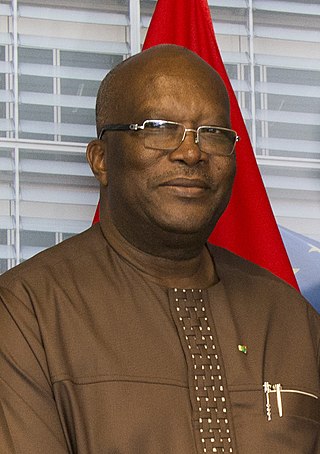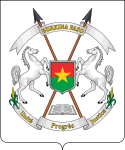
Burkina Faso is a landlocked country in West Africa, bordered by Mali to the northwest, Niger to the northeast, Benin to the southeast, Togo and Ghana to the south, and Ivory Coast to the southwest. It covers an area of 274,223 km2. In 2021, the country had an estimated population of approximately 23,674,480. Previously called the Republic of Upper Volta (1958–1984), it was renamed Burkina Faso by former president Thomas Sankara. Its citizens are known as Burkinabè, and its capital and largest city is Ouagadougou.

The Politics of Burkina Faso takes place in a framework of a semi-presidential republic, whereby the Prime Minister of Burkina Faso is the head of government, and of a multi-party system. The President of Burkina Faso is the head of state. Executive power is exercised by both the President and the Government. Legislative power is vested in both the government and parliament. The party system was dominated by the Congress for Democracy and Progress (CDP) until 2014. Burkina Faso's CDP fell victim to a series of demonstrations and riots, to alter the constitution and extend the former president's term in office - referred to as the 2014 Burkinabé uprising. The military then declared itself to be in power and the state shifted to an electoral autocracy. Burkina Faso lacks the foundation that would support a democracy, with its current transition to a military regime, but not all hope is lost. After an internal coup ousted Paul-Henri Sandaogo Damiba, the previous military head of state, a new transitional charter was adopted, naming Captain Ibrahim Traoré as president. Mr. Damiba's progressional failures on the state's security front “swung a majority of domestic opinion in favour of the MPSR”. Mr. Traoré pledged a major reinforcement of armed forces to strengthen frontline units and recruited over 3,000 more troops. As the violence becomes so entrenched, it is nonetheless expected that the security situation will remain dire in the medium term. “However, we expect that elections will still be held in 2024 as part of the army's plan to stabilise the security situation by boosting counter-terrorism operations.”

The history of Burkina Faso includes the history of various kingdoms within the country, such as the Mossi kingdoms, as well as the later French colonisation of the territory and its independence as the Republic of Upper Volta in 1960.

Moussa Traoré was a Malian military officer, politician, and dictator who served as the second President of Mali from 1968 to 1991. As a lieutenant, he led the military ousting of President Modibo Keïta in 1968. Thereafter he served as head of state until March 1991, when he was overthrown by popular protests and a military coup.

Roch Marc Christian Kaboré is a Burkinabé banker and politician who served as the President of Burkina Faso from 2015 until he was deposed in 2022. He was the Prime Minister of Burkina Faso between 1994 and 1996 and President of the National Assembly of Burkina Faso from 2002 to 2012. Kaboré was also president of the Congress for Democracy and Progress (CDP) until his departure from the party in 2014. He founded the People's Movement for Progress party that same year.
Articles related to Burkina Faso include:

The Radiodiffusion Télévision du Burkina is the national broadcaster of the West African state of Burkina Faso. Radiodiffusion Télévision du Burkina is headquartered in the capital city Ouagadougou. Generaldirector (CEO) of RTB is Marcel Toé.

Sankarism is a term sometimes applied to denote a left-wing ideological trend within the politics of Burkina Faso, a landlocked country in West Africa, as well as the policies of the military government led by Captain Thomas Sankara. Sankara came to power in what was then the Republic of Upper Volta in a popularly supported 1983 military coup, and ruled until his assassination in a coup led by Blaise Compaoré in 1987.

General elections were held in Burkina Faso on 29 November 2015. These were the first national elections in the country since the 2014 Burkinabé uprising and the departure of President Blaise Compaoré, who had ruled Burkina Faso for 27 years. Compaoré's political party, the Congress for Democracy and Progress, was banned from presenting a presidential candidate in the presidential elections but was still able to participate in the parliamentary election.

The 2014 Burkina Faso uprising was a series of demonstrations and riots in Burkina Faso in October 2014 that quickly spread to multiple cities. They began in response to attempts at changing the constitution to allow President Blaise Compaoré to run again and extend his 27 years in office. Pressure for political change came from civil society and in particular from the country's youth. Following a tumultuous day on 30 October, which included the involvement of former Defence Minister Kouamé Lougué and the burning of the National Assembly and other government buildings as well as the ruling Congress for Democracy and Progress party's headquarters, Compaoré dissolved the government and declared a state of emergency before eventually fleeing to Côte d'Ivoire with the support of Ivorian President Alassane Ouattara.
The 1982 Upper Voltan coup d'état took place in the Republic of Upper Volta on 7 November 1982. The coup, led by Colonel Gabriel Somé Yorian and a slew of other junior officers within the military, many of them political radicals, overthrew the regime of Colonel Saye Zerbo. Zerbo had previously taken power just under two years prior to his own downfall.

A coup d'état was launched in Burkina Faso on 23 January 2022. Gunfire erupted in front of the presidential residence in the Burkinabé capital Ouagadougou and several military barracks around the city. Soldiers were reported to have seized control of the military base in the capital. The government denied there was an active coup in the country. Several hours later, President Roch Marc Christian Kaboré was reported to have been detained by the soldiers at the military camp in the capital. On 24 January, the military announced on television that Kaboré had been deposed from his position as president. After the announcement, the military declared that the parliament, government and constitution had been dissolved. The coup d'état was led by military officer Paul-Henri Sandaogo Damiba.

Paul-Henri Sandaogo Damiba is a Burkinabé military officer who served as interim president of Burkina Faso from 31 January 2022 to 30 September 2022, when he was removed in a coup d'état by his own military colleague Ibrahim Traoré. Damiba had come to power just eight months earlier, on 24 January 2022, when he removed president Roch Marc Christian Kaboré in a coup.

The Patriotic Movement for Safeguard and Restoration (PMSR) has been the ruling military junta of Burkina Faso since the January 2022 Burkina Faso coup d'état. Originally it was led by Paul-Henri Sandaogo Damiba, but he was overthrown by dissatisfied junta members during the September 2022 Burkina Faso coup d'état. In his place, Capt. Ibrahim Traoré was installed as the leading figure. Aside of Traoré and Sorgho, other MPSR members are not known to the public.

A coup d'état took place in Burkina Faso on 30 September 2022, removing Interim President Paul-Henri Sandaogo Damiba over his alleged inability to deal with the country's Islamist insurgency. Damiba had come to power in a coup d'état eight months earlier. Captain Ibrahim Traoré took over as interim leader.

Ibrahim Traoré is a Burkinabé military officer who has been the interim leader of Burkina Faso since the September 2022 coup d'état that ousted interim president Paul-Henri Sandaogo Damiba. At age 36, Traoré is currently the second youngest serving state leader in the world after Icelandic Prime Minister Kristrún Frostadóttir, and the youngest serving president.



























